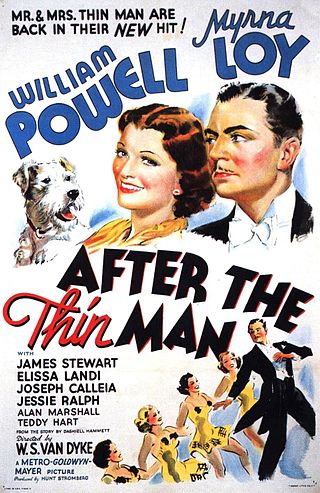
After the Thin Man is a 1936 American murder mystery comedy film directed by W. S. Van Dyke and starring William Powell, Myrna Loy and James Stewart. A sequel to the 1934 feature The Thin Man, the film presents Powell and Loy as Dashiell Hammett's characters Nick and Nora Charles. The film also features Elissa Landi, Joseph Calleia, Jessie Ralph, Alan Marshal and Penny Singleton.

Night Must Fall is a play, a psychological thriller, by Emlyn Williams, first performed in 1935. There have been three filmed adaptations: Night Must Fall (1937); a 1954 adaptation on the television anthology series Ponds Theater starring Terry Kilburn, Una O'Connor, and Evelyn Varden; and Night Must Fall (1964).
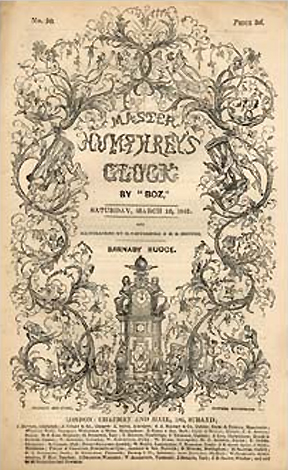
The Old Curiosity Shop is the fourth novel by English author Charles Dickens; being one of his two novels published along with short stories in his weekly serial Master Humphrey's Clock, from 1840 to 1841. It was so popular that New York readers reputedly stormed the wharf when the ship bearing the final instalment arrived in 1841.

Twilight Zone: The Movie is a 1983 American sci-fi horror anthology film produced by Steven Spielberg and John Landis. Based on Rod Serling's 1959–1964 television series of the same name, the film features four stories directed by Landis, Spielberg, Joe Dante, and George Miller. Landis' segment is an original story created for the film, while the segments by Spielberg, Dante, and Miller are remakes of episodes from the original series. The film's cast includes Dan Aykroyd, Albert Brooks, Scatman Crothers, John Lithgow, Vic Morrow, and Kathleen Quinlan. Original series cast members Burgess Meredith, Patricia Barry, Peter Brocco, Murray Matheson, Kevin McCarthy, Bill Mumy, and William Schallert also appear in the film, with Meredith assuming Serling's role as narrator.
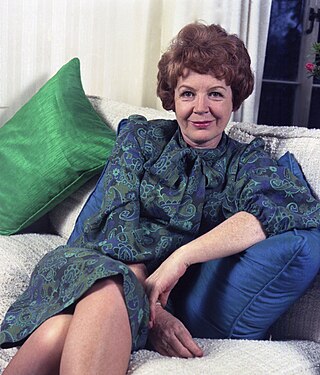
Phyllis Hannah Murray-Hill, known professionally as Phyllis Calvert, was an English film, stage and television actress. She was one of the leading stars of the Gainsborough melodramas of the 1940s such as The Man in Grey (1943) and was one of the most popular movie stars in Britain in the 1940s. She continued her acting career for another 50 years.

Anna Quirentia Nilsson was a Swedish-American actress who achieved success in American silent movies.
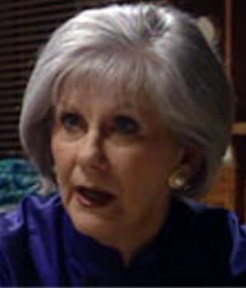
Madge Bishop is a fictional character from the Australian soap opera Neighbours, played by Anne Charleston. She made her first appearance during the episode broadcast on 20 January 1986. Madge was introduced as the sister of original character Max Ramsay. She soon becomes the main matriarch of the Ramsay family. Madge arrives with her marriage in tatters, following a brief but passionate affair with Raymond Philips, her son in prison, and her daughter a runaway teen; she rolled up her sleeves and got a job in The Waterhole to support the family as a single mother. She departed on 27 November 1992, before making a return on 7 November 1996. Madge died on 6 April 2001 from terminal pancreatic cancer. Charleston reprised the role for the show's 30th anniversary celebrations from 4–20 March 2015, and for the intended finale on 28 July 2022.

Charles Henry Pywell Daniell was an English actor who had a long career in the United States on stage and in cinema. He came to prominence for his portrayal of villainous roles in films such as Camille (1936), The Great Dictator (1940), Holiday (1938) and The Sea Hawk (1940). Daniell was given few opportunities to play sympathetic or 'good guy' roles; an exception was his portrayal of Franz Liszt in the biographical film of Robert and Clara Schumann, Song of Love (1947). His name is sometimes spelled "Daniel".

Dorothy Burke is a fictional character from the Australian television soap opera Neighbours, played by Maggie Dence. The actress accepted the role after being approached by a representative from the show's production company. She made her first appearance during the episode broadcast on 7 March 1990. Dorothy is portrayed as an eccentric. She is well travelled and speaks several languages. She often wears black clothing, which a writer for the official show website said gives her "a witch-like appearance." During her time in the show, Dorothy was the principal of Erinsborough High School. Dence did not have much in common with Dorothy, and a reporter noted that she was barely recognisable out of character, especially without her iconic hairstyle. Dence filmed her final scenes for Neighbours in November 1992. She confirmed that Dorothy would not be killed-off. Her final scenes aired on 3 February 1993, as Dorothy leaves Erinsborough with her love interest Tom Merrick.

The Case of the Howling Dog is a 1934 American mystery film directed by Alan Crosland, based on the 1934 novel of the same name by Erle Stanley Gardner. It is first in a series of six Perry Mason films Warner Bros. made between the years 1934 and 1937.
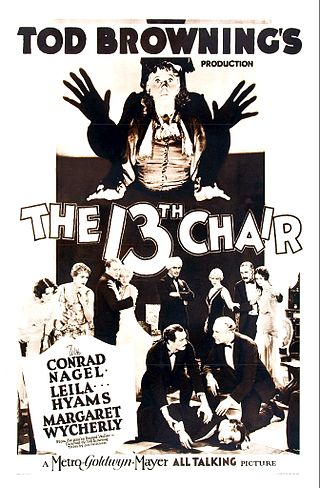
The Thirteenth Chair is a 1929 American mystery film directed by Tod Browning. The picture is based on a 1916 play of the same name by Bayard Veiller. It stars Conrad Nagel, Leila Hyams and Margaret Wycherly.

Fires of Rebellion is a 1917 American silent drama film written and directed by Ida May Park, and starring Lon Chaney, William Stowell, and Dorothy Phillips. The film is today considered lost. A still exists showing Lon Chaney in the role of the lecherous photographer Russell Hanlon. The film's main musical theme was Serenade by R. Czerwonky.
Mary Hannah (May) Brahe was an Australian composer, best known for her songs and ballads. Her most famous song by far is "Bless This House", recorded by John McCormack, Beniamino Gigli, Lesley Garrett and Bryn Terfel. According to Move.com.au: "She was the only Australian woman composer to win local an international recognition before World War II," having "290 of her 500 songs published. Of these, 248 were written under her own name, the remainder under aliases.
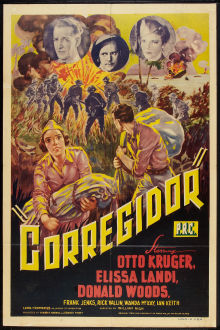
Corregidor is a 1943 American war film directed by William Nigh and starring Otto Kruger, Elissa Landi and Donald Woods. The film is set in December 1941 through May 1942 during the Japanese invasion of the Philippines. Corregidor opens with the following written dedication: "Dedicated to the heroes of the United States and Philippine Armed Forces, and the American Red Cross." The film closes with a poem about Corregidor written and narrated by English poet Alfred Noyes.
"Blye, K., Part 2" is the 17th episode of the third season of the American crime drama television series NCIS: Los Angeles, and the 65th episode overall. It originally aired on CBS in the United States on February 28, 2012. The episode was written by Dave Kalstein and directed by Terrence O'Hara, and was seen by 15.85 million viewers in its original American broadcast.

The Thirteenth Chair is a 1919 American silent mystery film directed by Léonce Perret and starring Yvonne Delva, Creighton Hale and Marie Shotwell. It was based on a play of the same name by Bayard Veiller. Subsequent film adaptations were made in 1929 as The Thirteenth Chair and 1937 again under the same title.

Nell Trent, also referred to as Little Nell, is a fictional character in the 1841 novel The Old Curiosity Shop by Charles Dickens. The novel's main character, she is portrayed as infallibly good and virginal. An orphan, she leads her grandfather on their journey to save them from misery but gradually becomes weaker throughout the journey, and although she finds a home with the help of a schoolmaster, she sickens and dies before her friends in London find her. Her death has been described as "the apotheosis of Victorian sentimentality."

The Thirteenth Chair is a 1916 play by the American writer Bayard Veiller. It has three acts and a single setting. The action takes place entirely in the drawing room of a large house in New York City during one evening. One critic labelled it a melodrama using mystery fiction devices: a murder during a seance, and a locked-room mystery. There are no clues given to the audience to identify the murderer, who is exposed only by supernatural agency in the last act.
















